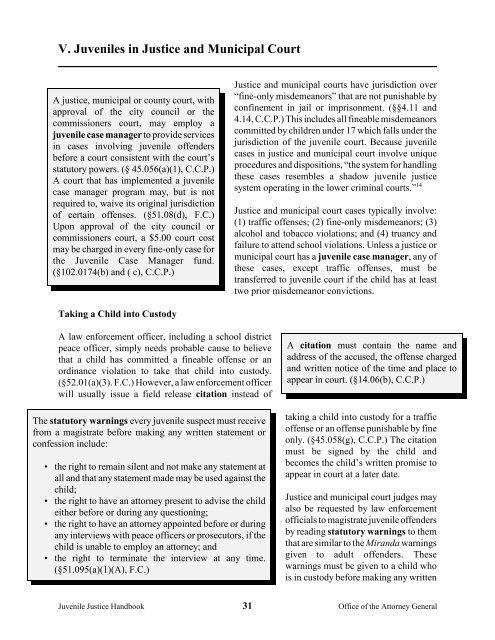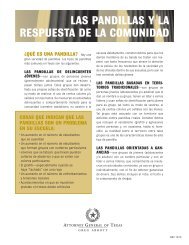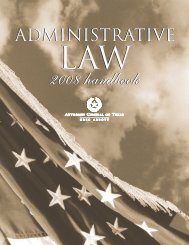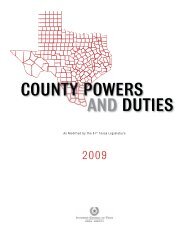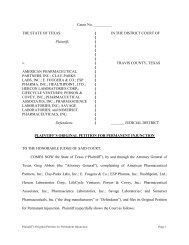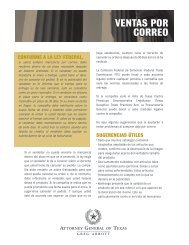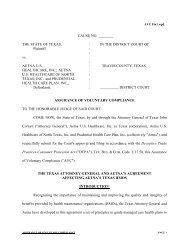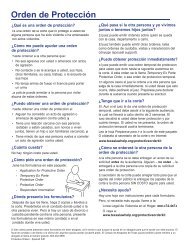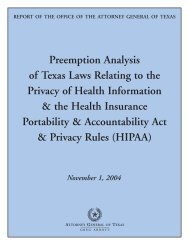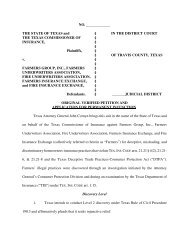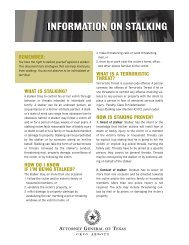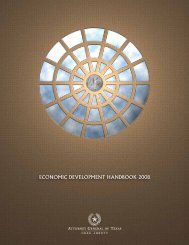Juvenile Justice Handbook - Texas Attorney General
Juvenile Justice Handbook - Texas Attorney General
Juvenile Justice Handbook - Texas Attorney General
Create successful ePaper yourself
Turn your PDF publications into a flip-book with our unique Google optimized e-Paper software.
V. <strong>Juvenile</strong>s in <strong>Justice</strong> and Municipal Court<br />
______________________________________________________________________________<br />
A justice, municipal or county court, with<br />
approval of the city council or the<br />
commissioners court, may employ a<br />
juvenile case manager to provide services<br />
in cases involving juvenile offenders<br />
before a court consistent with the court’s<br />
statutory powers. (§ 45.056(a)(1), C.C.P.)<br />
A court that has implemented a juvenile<br />
case manager program may, but is not<br />
required to, waive its original jurisdiction<br />
of certain offenses. (§51.08(d), F.C.)<br />
Upon approval of the city council or<br />
commissioners court, a $5.00 court cost<br />
may be charged in every fine-only case for<br />
the <strong>Juvenile</strong> Case Manager fund.<br />
(§102.0174(b) and ( c), C.C.P.)<br />
<strong>Justice</strong> and municipal courts have jurisdiction over<br />
“fine-only misdemeanors” that are not punishable by<br />
confinement in jail or imprisonment. (§§4.11 and<br />
4.14, C.C.P.) This includes all fineable misdemeanors<br />
committed by children under 17 which falls under the<br />
jurisdiction of the juvenile court. Because juvenile<br />
cases in justice and municipal court involve unique<br />
procedures and dispositions, “the system for handling<br />
these cases resembles a shadow juvenile justice<br />
system operating in the lower criminal courts.” 14<br />
<strong>Justice</strong> and municipal court cases typically involve:<br />
(1) traffic offenses; (2) fine-only misdemeanors; (3)<br />
alcohol and tobacco violations; and (4) truancy and<br />
failure to attend school violations. Unless a justice or<br />
municipal court has a juvenile case manager, any of<br />
these cases, except traffic offenses, must be<br />
transferred to juvenile court if the child has at least<br />
two prior misdemeanor convictions.<br />
Taking a Child into Custody<br />
A law enforcement officer, including a school district<br />
peace officer, simply needs probable cause to believe<br />
that a child has committed a fineable offense or an<br />
ordinance violation to take that child into custody.<br />
(§52.01(a)(3). F.C.) However, a law enforcement officer<br />
will usually issue a field release citation instead of<br />
The statutory warnings every juvenile suspect must receive<br />
from a magistrate before making any written statement or<br />
confession include:<br />
• the right to remain silent and not make any statement at<br />
all and that any statement made may be used against the<br />
child;<br />
• the right to have an attorney present to advise the child<br />
either before or during any questioning;<br />
• the right to have an attorney appointed before or during<br />
any interviews with peace officers or prosecutors, if the<br />
child is unable to employ an attorney; and<br />
• the right to terminate the interview at any time.<br />
(§51.095(a)(1)(A), F.C.)<br />
A citation must contain the name and<br />
address of the accused, the offense charged<br />
and written notice of the time and place to<br />
appear in court. (§14.06(b), C.C.P.)<br />
taking a child into custody for a traffic<br />
offense or an offense punishable by fine<br />
only. (§45.058(g), C.C.P.) The citation<br />
must be signed by the child and<br />
becomes the child’s written promise to<br />
appear in court at a later date.<br />
<strong>Justice</strong> and municipal court judges may<br />
also be requested by law enforcement<br />
officials to magistrate juvenile offenders<br />
by reading statutory warnings to them<br />
that are similar to the Miranda warnings<br />
given to adult offenders. These<br />
warnings must be given to a child who<br />
is in custody before making any written<br />
<strong>Juvenile</strong> <strong>Justice</strong> <strong>Handbook</strong> 31<br />
Office of the <strong>Attorney</strong> <strong>General</strong>


